From the desk of Martin De Vlieghere on Fri, 2005-11-25 19:27
This article was written by Martin De Vlieghere, Paul Vreymans and Willy De Wit of the Flemish think tank Work for All.
“America’s social model is flawed, but so is France’s,” the Parisian newspaper Le Monde recently wrote. According to Le Monde Europe should adopt the “Scandinavian model,” which is said to combine the economic efficiency of the Anglo-Saxon social model with the welfare state benefits of the continental European ones. On the eve of the EU’s Hampton Court Summit (October 27), one could even read that “Britain might be forced to discuss the advantages of Scandinavian models, which rely on more social security.”
... the efficiency of the major Scandinavian economies is a myth. The Swedish and Finnish welfare states have been going through a long period of decline. In the early 1990s they were virtually bankrupt. Between 1990 and 1995 unemployment increased five-fold. The Scandinavian countries have not been able to recover.
The implosion of the welfare state
In 1970, Sweden’s level of prosperity was one quarter above Belgium’s. By 2003 Sweden had fallen to 14th place from 5th in the prosperity index, two places behind Belgium. According to OECD figures, Denmark was the 3rd most prosperous economy in the world in 1970, immediately behind Switzerland and the United States. In 2003, Denmark was 7th. Finland did badly as well. From 1989 to 2003, while Ireland rose from 21st to 4th place, Finland fell from 9th to 15th place.
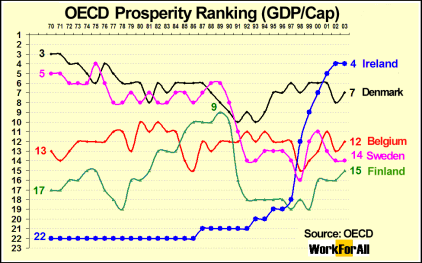
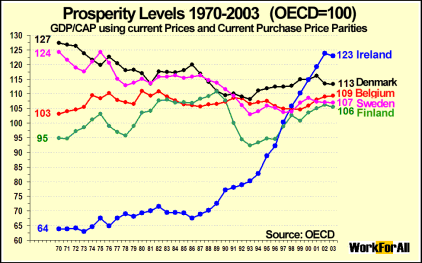
Together with Italy, these three Scandinavian countries are the worst performing economies in the entire European Union. Rather than taking them as an example, Europe’s politicians should shun the Scandinavian recipes.
Jobs
While a poorly performing economy such as Belgium’s was able to create 8% new jobs between 1981 and 2003, Sweden and Finland were unable to create any jobs at all in over two decades. Denmark did a little better because it “activated” its labour market by making it more “flexible.” It became easier for employers to fire people. For workers in the construction industry the term of notice was reduced to five days. Unemployment benefits were restricted in time, while those who had been unemployed for a long time, and young people could lose benefits if they refuse to accept jobs, including low-productivity jobs below their level of training or education. The result is that productivity growth in Denmark is lower than in Sweden and Finland.
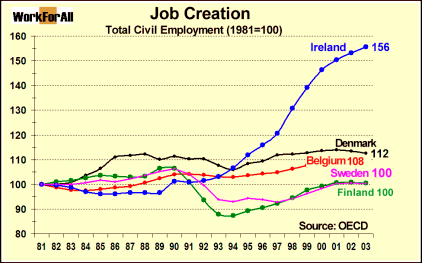
These draconian measures reduced the unemployment rate, but did not eliminate the cause of unemployment, namely the total lack of motivation on the part of employees and employers resulting from the extremely high taxation level. Despite the painful measures, the growth of Danish productivity and prosperity has been substandard. Disappointment in Danish politicians is one of the reasons for the rise of the far right.
Weak government, bad government
Why are the Scandinavian countries doing such a bad job, despite their Protestant work ethic and devotion to duty? The main cause is the essence of the nanny state: its very high tax level. Between 1990 and 2005 the average overall tax burden was 55% in Finland, 58% in Denmark and 61% in Sweden. This is almost one and a half times the OECD average.
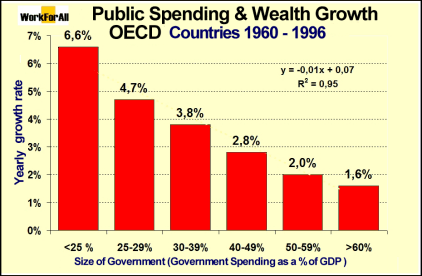
In his research into the causes of growth differences between OECD economies the American economist James Gwartney showed that there was a direct correlation between economic growth and tax burden. The higher the level of taxation, the lower the growth rate. The explanation for this phenomenon is as logical as it is simple. The higher the tax level, the lower the incentive for people to make a productive contribution to society. The higher the fiscal burden, the more resources flow from the productive sector to the ever more inefficient government apparatus.
Ireland: the efficient alternative
Ireland has proved that a substantial lowering of the taxation level can become the motor for launching even the most slackish economy into full gear. A drastic reduction of the Irish tax rate, from 53% in 1986 to its current 35% , has led to a continuous boom of wealth creation at an average rate of 5.6% during the past two decades, while the number of jobs has grown by over 50%. In barely 18 years Ireland jumped from the 22nd to the 4th place in the OECD prosperity ranking. Ireland did not reduce its social welfare benefits. On the contrary. The unprecedented growth led to an increase of fiscal revenue and social expenditure. It was sufficient to improve the productivity of the government.
One crucial element of the Irish model is its “fair tax” system, in which there is less emphasis on taxing labour and profit and slightly more on taxing consumption. This balance between direct and indirect taxation motivates labourers and entrepreneurs to make productive contributions. It stimulates new initiatives and guarantees a high degree of participation.
Such a fiscal system does not put the entire burden of financing social security on domestic production. Indeed, a consumption tax ensures that foreign production also contributes evenly.
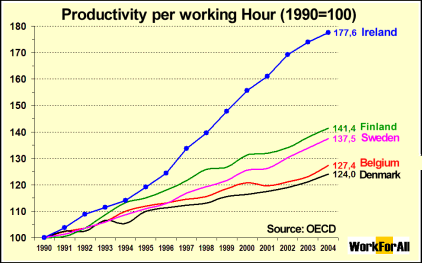
The Irish model combines the so-called “active welfare state” of continental Europe with the Anglo-Saxon liberal economy in a balanced fashion. The model is efficient. Ireland surpasses all other EU members in prosperity, job creation, social expenditure and productivity per working hour.
Investing in the future
The difference between the wealth destructive Scandinavian model and the booming Irish alternative is obvious for all to see. Strangely enough, however, the French and German governments do not seem to notice. Those in Belgium do not, either. The Belgian government recently proposed a new policy plan inspired by the Danish model. The tax level is not reduced, the fiscal burden is not being shifted from production to consumption, but instead from one production factor (labour) to another (capital) which is already overburdened.
Saving is discouraged, too. After deducting inflation and the witholding tax, which under the European savings taxation directive will soon amount to 35%, the real net interest rate will be –2%. This means that every person in his thirties who is saving 1.00 euro today, will only have the equivalent of 0.54 euro when he turns 60. In barely six years the Belgian savings rate has already dropped by more than a quarter: from 12.4% in 1998 to 9.1% in 2004. The savings rate will drop even further, thereby drying up all reserves for investment. Like work, saving and investing, too, must be profitable if people are to engage in these activities.
Excessive taxation
2004 witnessed a record world economic growth of 5%. China and India are booming, the US and Japan are recovering. Gwartney’s findings explain why continental West European countries, such as Belgium, did not see their economies grow. The Belgian tax burden is 9% higher than the OECD average and 15% higher than the tax level in the US and Japan. If continental Western Europe does not change its policies, its relative impoverishment today will soon turn into absolute pauperization.
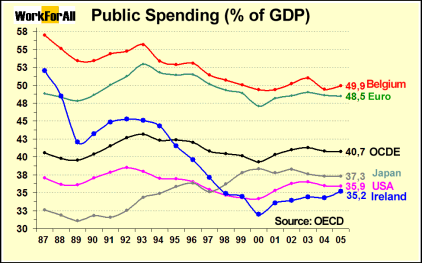
Its tax structure is not adapted to the challenges of globalization. Taxes on production are the opposite of import taxes. They double Europe’s production costs and, in doing so, halve its productivity. Like protectionism they lead to distortions in world trade, but they do so in the opposite direction. Ever more rapidly, continental Western Europe is losing its semi labour-intensive sectors to countries where productivity is even lower than in Western Europe. This move from high productivity to low productivity countries is a waste. It is not only a catastrophe for Western Europe’s employment. It is also bad for the world at large because the highly productive production apparatus and infrastructure of Western Europe is not used to its full capacity. This leads to less than optimal global labour division and wealth creation.
Politicians must realize that economic growth is not brought about by fiscally punishing productive citizens, nor by collective impoverishment and social welfare cuts, but by cutting taxes and bureaucracy. Ireland has shown that it can be done and how to do it.
http://www.brusselsjournal.com/node/510
Lower taxes would be great. I'd like to see more debt reduction and lower spending before that happens.
Can't wait to see the liberals and socialists go into paroxysms of denial over this report. ![]()
Minimum wage laws discriminate against those unskilled workers who are not worth whatever the minimum is.
If your skill set is worth $5 per hour then you're screwed if the minimum is $5.50.
Minimum wage laws discriminate against those unskilled workers who are not worth whatever the minimum is.
guess what bort? They wouldn't be hired, even if there was no minimum wage.
For those people who are actually in the labor force, however, minimum wage laws artificially supress the Marginal Cost resulting in more people working, at higher wages.
The only problem with all those jobs they created is that a lot of them suck! Much like the 'tech' jobs created in the Maritimes in the past decade. Most of them a crappy $7-8/hr jobs in call centres. Not something you can raise a family on...I know I worked for a company that had almost a dozen in the Maritimes and couldn't open them fast enough...
Besides, with all the righties constantly bitching about our falling productivity, we'll never get any six week vacations or free education like they have in Europe.
Really?
How many garment jobs exist in Canada? How many people work in knitting mills? How's your steel industry lately? Did you say 'hi' to your maid or gardener this morning?
Minimum wage laws either priced these jobs out of your market or they created wage pressures to push the jobs offshore.
In any case, an unskilled laborer has little hope to secure regular employment because who wants to pay full-bore for someone whose skills limit them to pushing a broom? But fifty years ago it wan't uncommon for stores and etc. to employ people full time to push a broom.
It may not be popular to say this, but it is true that minimum wage laws price categories of jobs out of existence and they effectively shut out people whose skill sets are not worth minimum wage to an employer.
You would not pay US$7.75 per hour to someone to push a broom all day long outside your business, but what about $2?
Here's the next question:
If someone is willing to work for me for $2 per hour then why can't I hire them at that rate? What business is it of government to interfere in our arrangement?
Besides, with all the righties constantly bitching about our falling productivity, we'll never get any six week vacations or free education like they have in Europe.
If you do not like the job opportunities offoered to you then implement your options:
1) Go to school and obtain more marketable skills.
2) Relocate to a market where you skills are in higher demand.
3) Become an entrepreneur and start your own business.
4) Fuck it all. Go on the dole and drink beer all day and keep the wife pregnant to prolong and increase the amount of your assistance check.
Myself, I chose #1 when faced with the same dilemma.
Really?
How many garment jobs exist in Canada? How many people work in knitting mills? How's your steel industry lately? Did you say 'hi' to your maid or gardener this morning?
Minimum wage laws either priced these jobs out of your market or they created wage pressures to push the jobs offshore.
So the more we become like vietnam the better off we'll be! Wonderful logic, perhaps next you'll tell us why the government shouldn't inspect meat because what business is it of theres if a company is using tuberculer meat.
The entire point of international trade is to specialize, and it simply isn't worth it for the first world to specialize in textiles, as there are in general far more valuable things to divert our resources to.
You're right, thats because most people in the US and Canada are skilled, and companies would rather hire a trained worker then an unskilled one. If they have to hire an unskilled worker they will, and they will train them.
Anyone in the US and Canada who doesn't suffer from severe handicaps has a skill set worth far more then $5 to employers.
If I need someone to push a broom around all day, I'll pay the 7.75 and as would any other employer. If I had a massive woodshop, I'd be sure to hire people to keep the shop safe and clean, if I run a small woodshop then I'll have it added to the duties of my regular employees.
Because the US doesn't want to engage in a race to the bottom with vietnam. Yes, we don't have very many textile companies, thats because the cost of living is higher, the workers here are skilled, and we have OSHA standards.
and your example is flawed because in the US, you won't find a person over 16 who will work for you for under 5.15, because the oppurtunity cost simply isn't worth it.
Thank heavens for that!
Europe is the last place we want to emulate. Who wants 10% unemployment?
There's evidence that minimum wage levels do help the economy, but only to a point. After that, a higher minimum wage hurts employment levels as it discourages hiring.